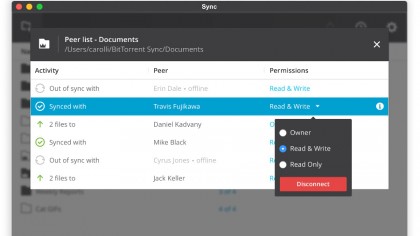Is it possible to have total privacy for your personal data?
Abandon the cloud and use P2P
Scattering the clouds
Ensuring your data is safe and secure can mean simply protecting it with a level of security you are comfortable with. This will mean deciding how many hoops you want to jump through each time you need access to that information. Simply swiping your finger across the reader on a hard drive, or notebook PC is fast and simple, and devices like the iPhone can similarly be accessed in seconds.
What if you wanted to break your connection with the cloud-based storage you have been using, and develop an independent system? This is possible thanks to peer-to-peer (P2P) networking. Here you don't store your data on a server in the cloud, but make a direct connection between two devices when you want to gain access to the information.
P2P of course became notorious thanks to BitTorrent, but today in an age where data security is paramount, P2P is being seriously touted as a way to gain more security over the data you are storing. P2P has also been used for years with projects like SETI, Rossetta@Home and Einstein@Home using decentralised computers to perform complex calculations. The same principle can be applied to secure data management.

And data storage is being democratised with services such as Symform that describes itself as 'crowdsourced backup'. Symform members contribute a percentage of their spare local storage space and bandwidth in exchange for free storage across the network.
The security of this system comes from its use of 256-bit encryption when the data is transmitted, and RAID 96 that divides the data between 96 different devices. The cloud and the data centres that support them use RAID 5 or 6. Whether this type of data storage technique becomes popular remains to be seen.
If you want to avoid the cloud then P2P is clearly an option to explore in detail. Systems like BitTorrent Sync have evolved to be slick and easy to use. If you work in teams that are geographically dispersed and data security is important, systems like this could be the answer. Private individuals who want to securely share data within their family for instance are also great candidates.
Going off grid
Completely severing the ties you have with cloud storage is also now possible. As a reaction to concerns about handing over what can sometimes be sensitive information to a faceless data centre, a number of new options have become available. There are now several alternatives to cloud storage that embrace the ideas behind P2P and moves this into a consumer product that offers plug-and-play functionality.
Sign up to the TechRadar Pro newsletter to get all the top news, opinion, features and guidance your business needs to succeed!
Neobase is the first private network device. As a successful Kickstarter campaign, the device connects to your network at home. The Neobase in effect creates your own social network between anyone that you want to share information with. The difference is that you are in control of whom you share your data with. No third-party cloud service is involved.

The developers of Neobase explain: "The Neobase is an encrypted device that lets you create a private social network that only you control. Sharing with friends and family is easy, and you decide exactly what you share and whom you share it with. The unique cloudless design of your Neobase and network means that all of the posts, comments, web links, photos and files you share are stored on your Neobase, and never pass through any website, service or cloud."
Transporter is a similar idea to Neobase in that it offers a private device to store data on that you invite people to join. There is a domestic and small business version of this device that can create a completely private network to connect anyone to.
In the past it has been possible to create your own network at home and even use a PC to create a server that anyone can connect to. These devices make setting up a private and closed network for friends, family or business use a fast and efficient process.
As Professor Jon Crowcroft concluded: "The more diversity we use in a peer-to-peer system, the closer we get to an ideal in terms of resilience and privacy."
There can be little doubt that our privacy has been eroded as digital technologies have infiltrated every facet of our lives. The levels of privacy you may want and those you can achieve are two very different things if you want to use social media and save, store and exchange information. However, systems like Neobase do enable us to reclaim a level of privacy we once enjoyed.